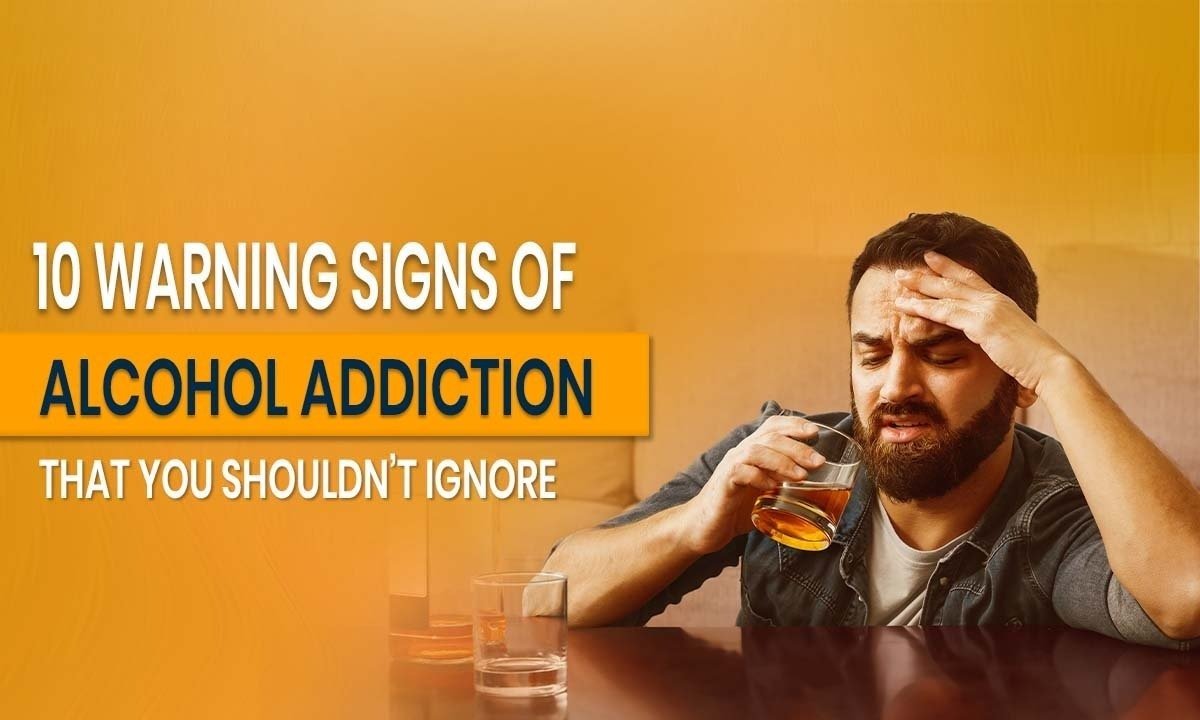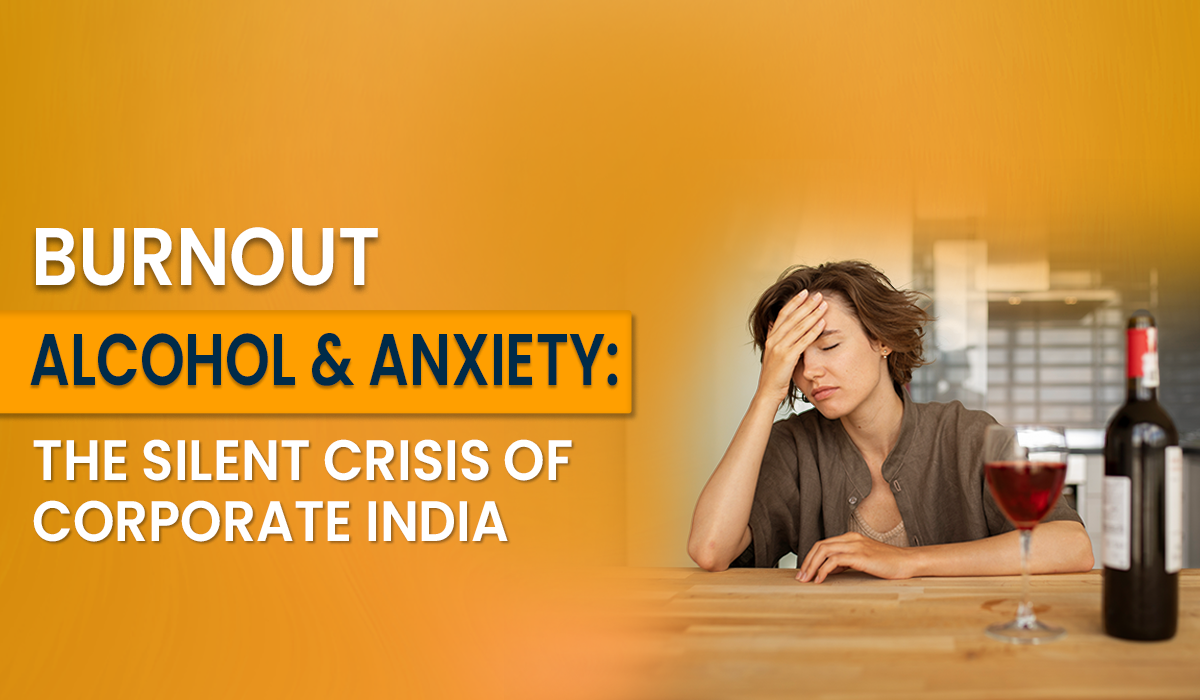Is your relationship with alcohol getting a bit too cozy? If so, you’re not alone. Many people find themselves in situations where alcohol has become more than just a casual drink—it’s a regular part of their daily routine. While a glass of wine with dinner or a beer at a party can be fun and social, when alcohol starts to control your life, it can quickly spiral into a serious problem.
If you’re reading this, it’s likely you’re either concerned about your own habits or those of someone you care about. Today, we’re going to break down 10 warning signs of alcohol addiction that you should never ignore. And remember, we’re not here to judge but to guide you through recognizing the symptoms of alcoholism early so that you can take steps towards recovery.
So, keep reading till the very end because this article will provide you with crucial information, and we’ll share some solutions that can help you turn your life around. Whether you’re in the early stages of alcohol use disorder, or you’re just concerned about the person you care about, understanding these warning signs can be a game-changer.
1. Increasing Tolerance: A Sneaky Symptom of Alcohol Dependency
If you find that it takes more alcohol to feel the same effects as before, you’re experiencing an increasing tolerance. This is one of the earliest signs of alcohol dependency. What seemed like a single glass of wine or a beer now requires you to drink more to feel relaxed or buzzed. As your tolerance grows, you might end up drinking larger quantities without even realizing it. This can be dangerous because it encourages heavy drinking, increasing your risk for both short-term and long-term health problems.
Solution: Recognizing this shift early is key. If you notice that you’re needing more to get the same buzz, it might be time to take a step back and evaluate your drinking habits.
2. Neglecting Responsibilities: Alcohol Taking Priority
One of the most significant warning signs of addiction is when alcohol starts to interfere with your daily responsibilities. Whether it’s work, school, or relationships, if you notice you’re consistently choosing alcohol over your obligations, that’s a red flag. Ignoring important commitments because of alcohol use can lead to consequences in both your personal and professional life.
Solution: Start by setting boundaries for yourself and avoid drinking when you know you have important tasks to complete. If you find it difficult to stick to this, it might be time to seek professional help.
3. Inability to Stop Drinking: The Tell-Tale Sign of Alcohol Use Disorder
Perhaps the most classic symptom of alcoholism is the inability to stop drinking once you’ve started. If you’ve ever found yourself saying, “I’ll only have one more drink,” but end up having several, this is a red flag. It signals a lack of control over your alcohol consumption.
Solution: You don’t have to fight this battle alone. Consulting a professional at an alcohol rehab center can provide the guidance you need to regain control over your life.
4. Using Alcohol to Cope with Stress or Emotions
Many people turn to alcohol as a coping mechanism when they are feeling stressed, anxious, or depressed. While it’s normal to have a drink or two to unwind, relying on alcohol to manage negative emotions is a dangerous symptom of alcoholism.
Solution: Recognize the difference between casual drinking and using alcohol to mask emotions. If alcohol is your first go-to when things get tough, reaching out to a professional for therapy or counseling can help you find healthier ways to cope.
5. Hiding Your Drinking Habits: Secrecy Equals a Problem
When drinking becomes something you feel the need to hide, it’s often a sign that things have gotten out of hand. If you’re sneaking drinks or lying about how much you’ve had, this could be a sign of alcohol use disorder.
Solution: Open communication is crucial—not just with others, but with yourself. If you’ve been hiding your drinking habits, it’s time to confront the truth and seek help. Alcohol treatment centers offer a safe environment where you can start your journey to recovery.
6. Physical Symptoms: Hangovers, Shakes, and Sweating
Alcohol addiction often comes with a set of physical symptoms. Hangovers become more severe, and you may experience shakes, sweating, or even nausea when not drinking. These symptoms occur as your body starts to rely on alcohol to function.
Solution: The best way to tackle physical dependence is through a structured alcohol rehab program. Detoxification under medical supervision is the safest method to manage these symptoms.
7. Relationship Struggles: Alcohol Putting a Strain on Your Personal Life
Alcohol use can also damage your relationships. If you notice that your drinking is causing fights or misunderstandings with loved ones, it might be time to address the issue. Alcohol dependency signs often manifest in the form of anger, arguments, and a lack of communication.
Solution: Acknowledge the impact alcohol has on your relationships. Consider seeking couples counseling or therapy to help repair these bonds and to begin a path toward recovery.
8. Feeling Guilt or Shame: Alcoholism Guilt Trip
After a drinking session, you may experience feelings of guilt, shame, or regret. These emotions are often linked to the realization that you’ve gone too far again, or that you’re not in control of your alcohol consumption. This cycle can be exhausting and disheartening.
Solution: If you constantly feel like you’re letting yourself or others down, it’s important to reach out for professional support. Alcohol treatment centers offer structured programs to help you break free from this cycle.
9. Blackouts: Memory Loss After Drinking
A serious warning sign of alcohol addiction is experiencing blackouts. These occur when you drink so much that you can’t remember what happened during your drinking episode. If this happens regularly, it’s a clear indication that your drinking habits have become problematic.
Solution: Seek help immediately if you’re experiencing blackouts. A medical professional can help assess the situation and provide treatment options to help you recover.
10. Withdrawal Symptoms: A Major Red Flag
If you find yourself experiencing physical or emotional withdrawal symptoms when you don’t drink, it’s time to take action. These symptoms can include anxiety, irritability, tremors, or even seizures. This is a sign that your body has become physically dependent on alcohol.
Solution: Don’t try to quit cold turkey without professional guidance. A rehab facility can provide the care you need to detox safely and start your recovery journey.
Conclusion: Take the First Step Towards Recovery Today!
If you recognize any of these warning signs of alcohol addiction in yourself or a loved one, it’s important to take action. Remember, overcoming alcohol addiction is not a journey you need to take alone. Contact Athena Luxus, a luxury rehab center in Delhi, and let us guide you through the recovery process. Our experienced team offers top-notch support and mental health services tailored to help you regain control of your life.
Don’t wait for tomorrow to start your journey towards recovery. The sooner you address the issue, the easier it will be to overcome. Contact us today and take the first step toward a healthier, more fulfilling life.
Patient Experiences
1. Ramesh Gupta: “I struggled with alcohol addiction for years, but Athena Luxus helped me regain control of my life. The staff is caring and professional, and their programs really work.”
2. Neha Sharma: “I never thought I could stop drinking until I reached out to Athena Luxus. Their rehab center gave me the support I needed to overcome my addiction.”
3. Vinay Kumar: “Athena Luxus was a game-changer for me. The holistic approach to rehab helped me understand my addiction and build a sustainable recovery plan.”
4. Aarti Singh: “I’m grateful for the support I received from Athena Luxus. Their team made sure I felt safe and understood every step of the way.”



